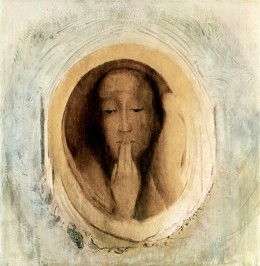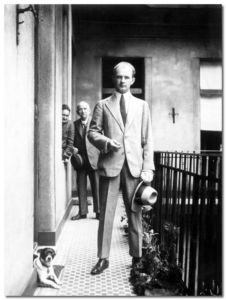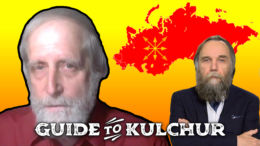Tag: Traditionalism
-
March 22, 2023 Julius Evola
Východ a Západ – gordický uzel:
kniha Ernsta Jüngera Der gordische Knoten
Kniha Ernsta Jüngera Der Gordische Knoten poprvé vyšla ve Frankfurtu nad Mohanem v roce 1953

Kniha Ernsta Jüngera Der Gordische Knoten poprvé vyšla ve Frankfurtu nad Mohanem v roce 1953
2.395 slov
English original here
Jméno Ernsta Jüngera si postupně získává takřka celoevropskou proslulost. Význam tohoto spisovatele coby filozofa se však pojí především s raným obdobím jeho života i tvorby. Tento veterán 1. světové války se po jejím skončení etabloval jako mluvčí generace, už ve své době označované za generaci „vyhořelou“. Jeho ideje nemají původ v abstraktních, za psacím stolem spřádaných spekulací, ale v prožité hrdinské zkušenosti, odkud postupně dospěly až k problému smyslu lidské bytosti ve věku nihilismu a všemocné techniky. Jeho ústředními pojmy jsou „heroický realismus“ a etika „absolutní osoby“. (more…)
-
The second half of the latest broadcast of Counter-Currents Radio is an Ask Me Anything with Greg Johnson and Gaddius Maximus, and it is now available for download and online listening. (more…)
-
November 15, 2022 Greg Johnson
Remembering René Guénon:
November 15, 1886–January 7, 1951René Guénon was born on November 15, 1886. Along with Julius Evola, Guénon was one of the leading figures in the Traditionalist school, which has deeply influenced my own outlook and the metapolitical mission and editorial agenda of Counter-Currents Publishing and North American New Right. (For a sense of my differences with Guénon, see my lecture on “Vico and the New Right.”)
-
Savitri Devi was a philosopher, a religious thinker, and a tireless polemicist and activist for the causes of animal rights, European pagan revivalism, Hindu nationalism, German National Socialism, and — after the Second World War — pan-European racial nationalism. She also sought to found a religion, Esoteric Hitlerism, fusing National Socialism with the Traditionalism of René Guénon and Julius Evola. All told, she was one of the most extraordinary personalities of the 20th century. (more…)
-
September 30, 2022 Julius Evola
Le secret du Véda selon Aurobindo
741 mots
English original here
De 1914 à 1916, le périodique Arya [en sanskrit signifie noble] — imprimé à Pondichéry en un nombre limité d’exemplaires et maintenant quasiment introuvable — publia une série d’essais de Srî Aurobindo sur le secret du Véda. Ces essais ont été réédités en un volume sous le même titre, Le secret du Véda (Cahiers du Sud, 1954) [réédité par Fayard en 1975]. (more…)
-
Part 1 of 4 (Part 2 here)
1. Introduction
Early in his career as a writer, Julius Evola published several philosophical works expounding a theory he called “magical idealism.” These include Saggi sull’idealismo magico (Essays on Magical Idealism, 1925), Teoria dell’individuo assoluto (Theory of the Absolute Individual, 1927), (more…)
-
2,376 words
Note: This essay is occasioned by the new Imperium Press edition of Sorel’s Reflections on Violence, which is required reading.
Like Jack London, Georges Sorel (1847–1922) was a Left-wing writer whose primary influence today is on the Right. Sorel’s most influential book is Reflections on Violence, written in 1905–1906. (more…)
-
-
6,859 words
Part 1 of 2 (Part 2 here)
The following is a transcript of the Guide to Kulchur interview with the Traditionalist scholar Charles Upton on the subject of Alexander Dugin that was broadcast on May 27. Mr. Upton was previously interviewed by Greg Johnson for Counter-Currents Radio in 2012. The transcript was prepared by Hyacinth Bouquet. (more…)
-
3,830 words
Béla Hamvas (1897-1968) was a Hungarian writer who was the first exponent of Tradition, as understood by René Guénon and Julius Evola, in his country, and remains a highly respected writer and novelist outside metaphysical circles as well. The following essay appeared in The Hungarian Quarterly no. 3 (March 1937).
When a Hungarian hears the word “Bakony” the picture evoked in his mind is not of the mountain range in western Hungary, which skirts lake Balaton for a hundred and fifty kilometres. Geographical names are usually mere names. (more…)
-
“If Guénon exposed the spiritual deceptions of the Theosophists and the Spiritualists, I consider it my duty, if I am serious about following him, to subject [Dugin] to the same treatment.” — Charles Upton (more…)











